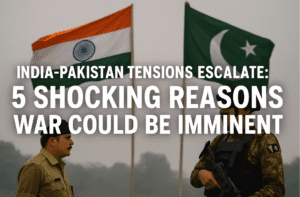India-Pakistan Tensions Escalate: 5 Shocking Reasons War Could Be Imminent
The United States has called for India and Pakistan to de-escalate tensions after a militant attack in Indian-administered Kashmir killed 26 civilians on April 22, marking the deadliest civilian violence in the region in two decades. India accused Pakistan of backing the attackers—a claim Islamabad denies—while survivors reported Hindu pilgrims were targeted. Both nations retaliated with tit-for-tat measures: suspending visas, halting water-sharing agreements, and closing airspace.
Pakistan warned of “credible intelligence” hinting at potential Indian military strikes, mirroring past crises, as Prime Minister Narendra Modi vowed retribution. Cross-border skirmishes and diplomatic spats escalated, while social media crackdowns blocked Pakistani content in India. The crisis underscores the fragility of Kashmir, a nuclear flashpoint since 1947, with global powers urging dialogue to prevent catastrophe. Analysts stress the need for third-party mediation to address deep-rooted distrust, as civilians bear the brunt of geopolitical brinkmanship.

India-Pakistan Tensions Escalate: 5 Shocking Reasons War Could Be Imminent
The United States has intensified diplomatic efforts to prevent a dangerous escalation between India and Pakistan following a devastating militant attack in Indian-administered Kashmir on April 22, which killed 26 civilians. Secretary of State Antony Blinken urged both nations to prioritize dialogue, reflecting global concerns over potential military conflict between the nuclear-armed rivals.
Attack Sparks Fury and Finger-Pointing
The assault occurred in Pahalgam, a tourist hotspot, where gunmen targeted Hindu pilgrims and local laborers. Survivors reported militants singling out Hindu men, amplifying communal tensions. While no group has claimed responsibility, Indian authorities identified two alleged Pakistani nationals among the attackers, accusing Pakistan of harboring militants—a claim Islamabad vehemently denies. The Resistance Front, a Kashmiri militant group linked to Pakistan-based Lashkar-e-Taiba, initially surfaced as a suspect but later denied involvement.
Tit-for-Tat Measures Raise Stakes
In response, India suspended visas for Pakistani nationals, halted a decades-old water-sharing pact, and blocked Pakistani aircraft from its airspace—a move mirrored by Pakistan. Over 700 Pakistanis and 1,400 Indians have since crossed borders amid heightened security. Social media platforms like Instagram restricted accounts of Pakistani celebrities in India, citing legal requests, while Indian authorities banned Pakistani news channels for “provocative content.”
Military Posturing and Historical Context
Pakistani officials warned of “credible intelligence” suggesting imminent Indian military action, reminiscent of 2019’s Balakot airstrikes after the Pulwama attack. Prime Minister Narendra Modi, facing domestic pressure, reportedly granted the military autonomy to decide retaliation tactics. Cross-border skirmishes have intensified, with both sides reporting ceasefire violations.
Why This Crisis Matters
- Human Cost: The attack marks the deadliest civilian toll in Kashmir since 2003, reigniting trauma in a region scarred by decades of insurgency.
- Strategic Risks: With both nations possessing nuclear arsenals, miscalculations could have catastrophic consequences.
- Geopolitical Dynamics: The U.S. treads a delicate line, balancing its strategic partnership with India against the need to prevent regional instability.
Expert Insights
Security analysts highlight Pakistan’s precarious position amid economic turmoil and India’s political calculus ahead of elections. “Modi’s strongman image hinges on a decisive response, but overt military action risks spiraling into war,” says New Delhi-based analyst Amit Ranjan. Meanwhile, Islamabad’s denial of involvement underscores its struggle to counter militant factions operating from its soil.
Pathways to De-escalation
While rhetoric remains heated, backchannel diplomacy and third-party mediation—potentially involving the UAE or Saudi Arabia—could offer off-ramps. The U.S. emphasis on joint investigations into the attack may bridge trust gaps, though historical grievances loom large.
Conclusion
The Kashmir attack has exposed the fragility of India-Pakistan relations, where unresolved territorial disputes and mutual distrust fuel cyclical crises. As global powers urge restraint, the coming days will test whether leadership in both nations can prioritize long-term stability over short-term political gains. For civilians in Kashmir, caught in the crossfire, peace remains a distant hope amid the drumbeat of war.
You must be logged in to post a comment.